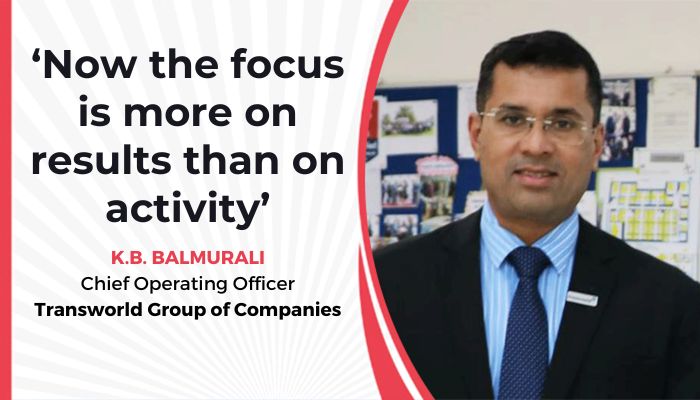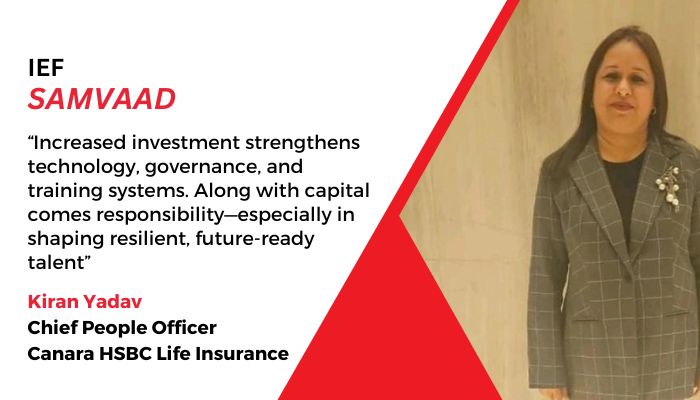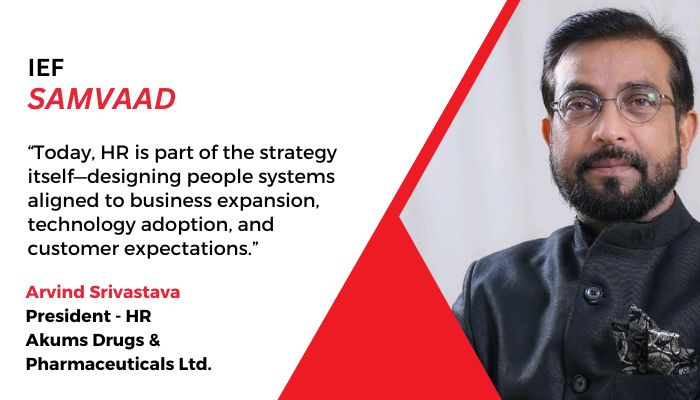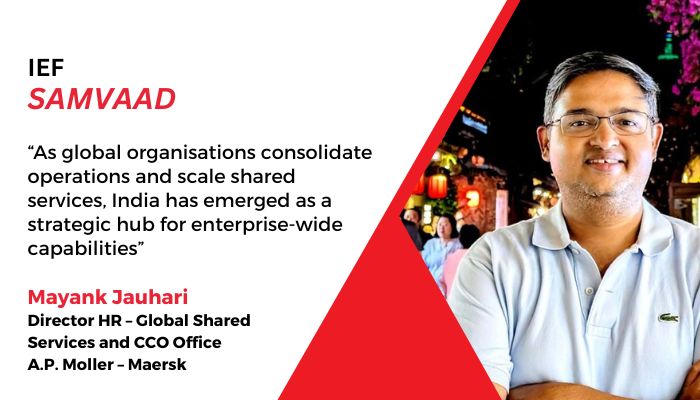K. B. Balmurali, Chief Operating Officer, Transworld Group of Companies, in a conversation with India Employer Forum on the future role of tech in the HR function, importance of reskilling and upskilling, including more women in the workforce, encouraging ease of doing business in India and more.
Q. Tell us a little about yourself.
My name is K.B. Balmurali. I was born and brought up in Mumbai in a joint family, where I was fortunately taught a lot of management lessons and leadership principles through my family members right from my childhood. I did my graduation in Commerce and then a Masters in labour studies from Mumbai University. I have an experience of almost 30 years. Started my career in 1994, where luckily for me, India was going through a transformation from a closed economy to a liberalised world and we saw a lot of changes happening, especially in the people segment. We saw change happening from Labour Management to Personnel Management to Human Resources management, and then in the late 2000, when the Y2K boom happened, a lot of transformation took place from Human Resources management to Knowledge Management and to Human Capital Management today.
In the span of 30 years, I got a chance to work in different Industries, starting with Aviation and then in 1999-2000, I moved into the shipping industry. In the last 22 years, I’ve been in the shipping industry in the Human Resources segment. I’ve moved from the role of a human resource to a business operations role to the chief people officer, and then got elevated to the role of chief operations officers of the group. So, it’s a big change for me personally, and thanks to the management that they could see the prospect of a person from a HR background getting into the business role. Personally, I’m very passionate about music, cricket and social activities, which our organisation encourages a lot.
Q. What are your views on the current and future role of Tech in the HR function? In what ways can HR Tech be utilised to provide a competitive advantage to Employers?
Today when we talk about technology, it is not something which is a matter of choice. If you take your own family, right from our grandmothers to a two-year-old, everyone is tech savvy. In fact, the children know more about tech than us. In every segment of life, tech is involved, whether it’s ordering milk or buying a mobile phone, you’re using tech now. So, it’s not a matter of choice, it’s a matter of completion, and in a way COVID really pushed digitalisation to the levels which the organisations were striving to reach. So, from an HR perspective, it’s a good opportunity to be a catalyst for bringing about this Tech revolution in the organisation. So, from a change management perspective, from the changing nature of work of people, I think HR needs to coordinate closely with the businesses in bringing about this change as far as HR itself as a role is concerned.
Now the focus is more on results than on activity, so what happened during COVID was earlier, of course, there was a transformation that was happening. You had a physical presence of people in the office, so leadership was more personal oriented, but the last two years of remote working has also speeded up delegation in a very big way. You don’t have to physically monitor whether the person is sitting in the office or if a salesperson is going out for a sales call or going somewhere else. So, now the focus is more on results, and this is happening all across. It’s not only in the business, but also if you see parenting in a big way has changed. Today, children are more informed and it’s more of a dialogue than a top-down approach, So, even in a business, you see that the top-down approach is more of a collaboration and business by consensus. So, this is where HR has to change its approach. It acts as a bridge between the management and the people in bringing about this positive change.
Q. How important is reskilling and upskilling? How can companies create a continuous learning culture to ensure that employees stay relevant?
Reskilling, upskilling, and I would also say that what covers the entire gamut today is change management. We are on the cusp of a generational shift as an organisation, from the 70s to the millennials to the Gen Zs. So, we have different segments of people who are working in the organisation. There is a perfect amalgamation of the new approach with the experience without losing the essence of both. From a management perspective, there are two aspects to this; we are talking about people who have been working in the organisation for a long time. And when I talk about people, it’s not only the staff, I’m also talking about the customers, the managers, the leaders across all segments. So, one is a change management in terms of their thinking. There is a resistance, and that is not something which is psychological but human in nature.
For example, when we moved from keypad mobile phones to smartphones, that change took some time. We used to feel that this is not going to work, but today you can’t imagine operating from a keypad phone, so that is a change in mindset. When we bring about these digital tools or digital initiatives, it calls for a lot of reskilling and unlearning. People are so used to something, that to bring them out of that comfort zone, to take away that resistance and change them is critical. This is one aspect of change management and reskilling. The second aspect is tomorrow’s customers, who are not just the employees who are going to join us, but also the Gen Zs who will be our customers and consumers. So the change needs to happen, keeping that in mind.
Q. Even with increased awareness and advocacy for including more women in the workforce, the participation of women in the labour force has fallen about 10% in the last 15 years. In what ways can policies and initiatives help to bring more women into the workforce?
Women empowerment is one of the key initiatives when we talk about bringing about a socio-economic change. We always try to encourage women folk to come into the mainstream. The mistake a lot of us do is to say and believe that women are equal to men or superior to men. We should not get into these things, talking about equal opportunity or being an equal opportunity employer. So, the way we approach a female candidate or when we go for a campus recruitment, we don’t necessarily have to use different yardsticks for men and women. I believe women are better than men in a lot of things, and we have to make them aware of their inherent strength. This is a social change that we need to bring about, especially in tier 2 and tier 3 cities in India, where women are expected to get married once they complete graduation. So, that is where the change has to start.
Why is it that if a woman is 20-21, you just want them to get married, and why is this never told to a boy. This has happened in bigger cities to a great extent. I see the change happening in India also now, but there needs to be a mindset change that parents need to stop thinking of women as a commodity. Women have got their own ambitions and aspirations, and today that is the biggest change that we should bring about in society. Why is it that a woman has to be dependent on the man of the house, or on the in-laws for their economic sustenance?
Q. Employers in India face a massive universe of compliances. What are your views on this and how can the government focus on reforms to eliminate and simplify existing regulations and encourage ease of doing business in India?
When the honourable Prime Minister of India opened up the communication channels, he launched an app where you can go and write. So, I have been personally writing to him through the portal to bring about changes in the way we make business transactions and I’m sure that there are lakhs of people apart from me who have written to it and we have seen those changes happening. An example of how small things can impact unproductive tasks. Earlier in India, there was something called reimbursement for medical expenses and it was Rs 15,000, for which one had to produce bills. We would see that around February-March, people would be lining up outside medical shops trying to get bills or produce bills. It was all an absolute waste of time. Also, once the bills were submitted, we had to attach all those bills given in the reimbursement form and then there was an auditor, who would come and check for non-medical items in the bill, thereby rejecting the claim. So, I personally wrote to the Prime Minister about it.
There is something called an LTA rule, which said that you need to go to your native place where we are all born and brought up. Now, say I’m born and brought up in Bangalore. My native place is Mumbai, so where do I go to claim this LTA? The recent amendments that have happened are the right step towards that direction, simplifying it for both, an employer and an employee. Secondly, we are talking about a globalised world. Today, India is at a very advantageous position because the whole world is talking about the China Plus One. So, China as a factory of the world is not going to be there as we go forward. The disruptions, especially in the supply chain that has happened during the COVID, has opened up the eyes of the world and people are looking at countries like India, Vietnam and Indonesia as substitutes, and India is perfectly placed in terms of its geographical location at the centre of the world.
Watch the full interview here: In Conversation with K.B. Balmurali | Chief Operating Officer | Transworld Group of Companies
About K.B. Balmurali
K.B. Balmurali, Chief Operating Officer at Transworld Group started his career as a trainee to then working in managerial roles and leading the HR departments. He then moved on to a Business Management role as a COO. An expert in Business strategy, Macroeconomics, Human Capital and more, he has experience across industries in Aviation, ITES, Shipping, and Logistics whilst managing global and strategic roles like handling M&As, Change management. Being a part of Management Steercoms from the early part of the career propelled the learning curve and provided him a macro-management overview.
At the outset of his career, while adding the real human element to the HR department, he is dealing with different generations of people from diverse backgrounds, cross-cultures Globally. He is a Commerce Graduate and Post-Graduate in Labour Studies from Mumbai University. Subsequently, he has completed a course in ‘Driving Corporate Performance’ from the Harvard Business School.
Balmurali is enthusiastic about music, cricket and striving to be a channel of positivity in the ecosystem by being actively associated with various social activities involved in People upliftment, Charity and Environmental work.






